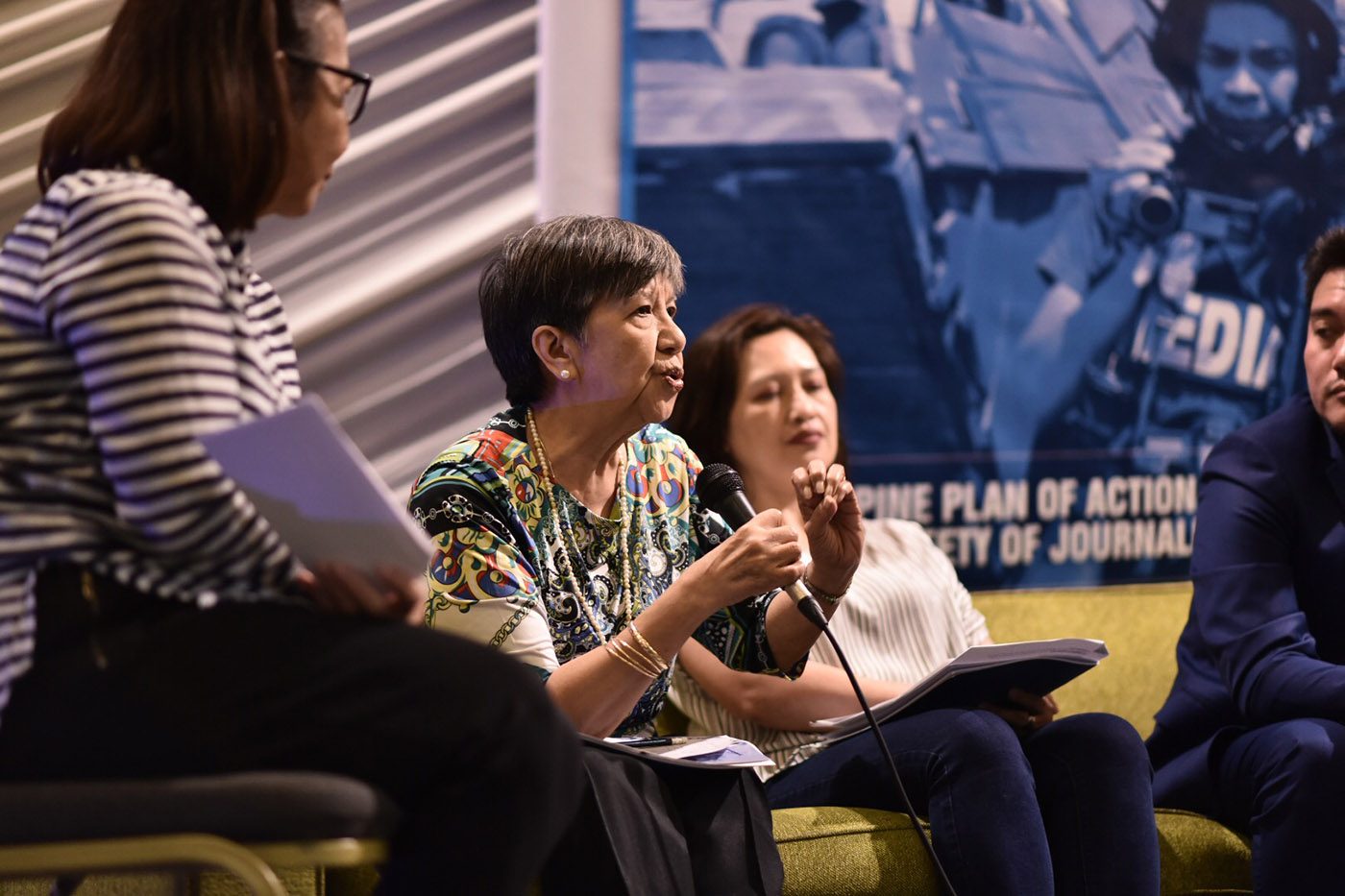SUMMARY
This is AI generated summarization, which may have errors. For context, always refer to the full article.

MANILA, Philippines – Though the government is a stakeholder in the Philippine Plan of Action on the Safety of Journalists (PPASJ), it is also an instigator of attacks against the press, said Center for Media Freedom and Responsibility (CMFR) Executive Director Melinda Quintos de Jesus. (READ: Multi-stakeholder group launches national plan for safety of journalists)
At the launch of the PPASJ on Friday, November 22, De Jesus said in a panel discussion that there is a need to “clear the air” between the government and the media in order for the plan to work. (READ: Do we need to die to do our jobs well?)
The PPASJ is a blueprint developed for the safety and protection of journalists and other media workers in the Philippines. The document was crafted through a multi-stakeholder process – with insights from the government – and was based on the United Nations Plan of Action on the Safety of Journalists and the Issue of Impunity.
For the plan to be successfully implemented, said De Jesus, trust needs to be built among the stakeholders.
“How do you buy in, how do you build up trust? We have to recognize that the context here is a little murky. In background, the things that have been happening are not trust building. There has been too much toxin, too much poison, too much red tagging, too much shaming – public shaming without evidence – of the press and its members with very little chance for the clearing of the air,” she said.
Journalists cover government officials because they are credentialed sources for news, she continued, and if there is “toxin in the air,” it comes from these official sources.
“If we need to move forward, we do need to rebuild the common ground,” De Jesus said.
“We need to clear the air. We need to promote a greater awareness of why some news has to be critical. Because citizens have to know how power is used. How their tax money is being applied to projects that serve the public good. If we abdicate on that responsibility, then we do not deserve the constitutional protection that indeed our Charter provides us,” she added.
De Jesus recommended more honest, candid meetings with government officials, though some might be uncomfortable with it. “If we do not and we are not ready to begin on that common ground, then this beautiful plan of action is dead in its tracks,” she said.
The PPASJ was launched on the eve of the 10th commemoration of the Maguindanao massacre, known as the deadliest single-day attack on journalists. Fifty-eight people died in the massacre, 32 of whom were journalists. No verdict has been passed on those accused. (READ: NUJP chair ‘confident’ Ampatuans will be convicted)
‘Justice now!’
On the same day, the University of the Philippines (UP) College of Mass Communication released a press statement demanding for “Justice now!” for the victims of the massacre. (READ: Supreme Court extends Ampatuan massacre judgment to December)
They wrote: “The government needs to be reminded that the whole world is watching, and the situation is both disappointing and disconcerting. The culture of impunity that informs Philippine society remains, as evidenced by the continuing killings of journalists and other forms of harassment and intimidation as a result of doing their job.”
They added that President Rodrigo Duterte enables this impunity, having accused media outlets like Rappler, Philippine Daily Inquirer, and ABS-CBN of being foreign owned or biased against the government.
The administration, they said, should stop harassing and intimidating the media to create an environment conducive to the practice of journalism.
UP Journalism Professor Danilo Arao expressed similar sentiments at the PPASJ launch.
“Partnership should not mean absolution of those who are guilty,” he said, following De Jesus’ comments on finding a common ground among all stakeholders.
“Individual accountability is very important, but it’s not just the individuals that we want to hold to account, but the very individuals who want to perpetuate the culture of impunity that informs Philippine society right now,” Arao said.
“So in a situation where the problem is systemic, then the institutions again should be held to account and if there are certain agencies that would either have to be abolished or reformed then we would have to do so,” he added.
In response to the sentiments raised by De Jesus, Arao, and National Union of Journalists of the Philippines Chairperson Nonoy Espina during the panel discussion, Abraham Agamata of Presidential Task Force on Media Security said that the government’s position is clear.
“The government is here to support and safeguard press freedom,” he said.
Justice Assistant Secretary Neal Vincent Bainto was also present at the PPASJ launch to give welcome remarks but did not join the panel. – Rappler.com
Add a comment
How does this make you feel?
There are no comments yet. Add your comment to start the conversation.